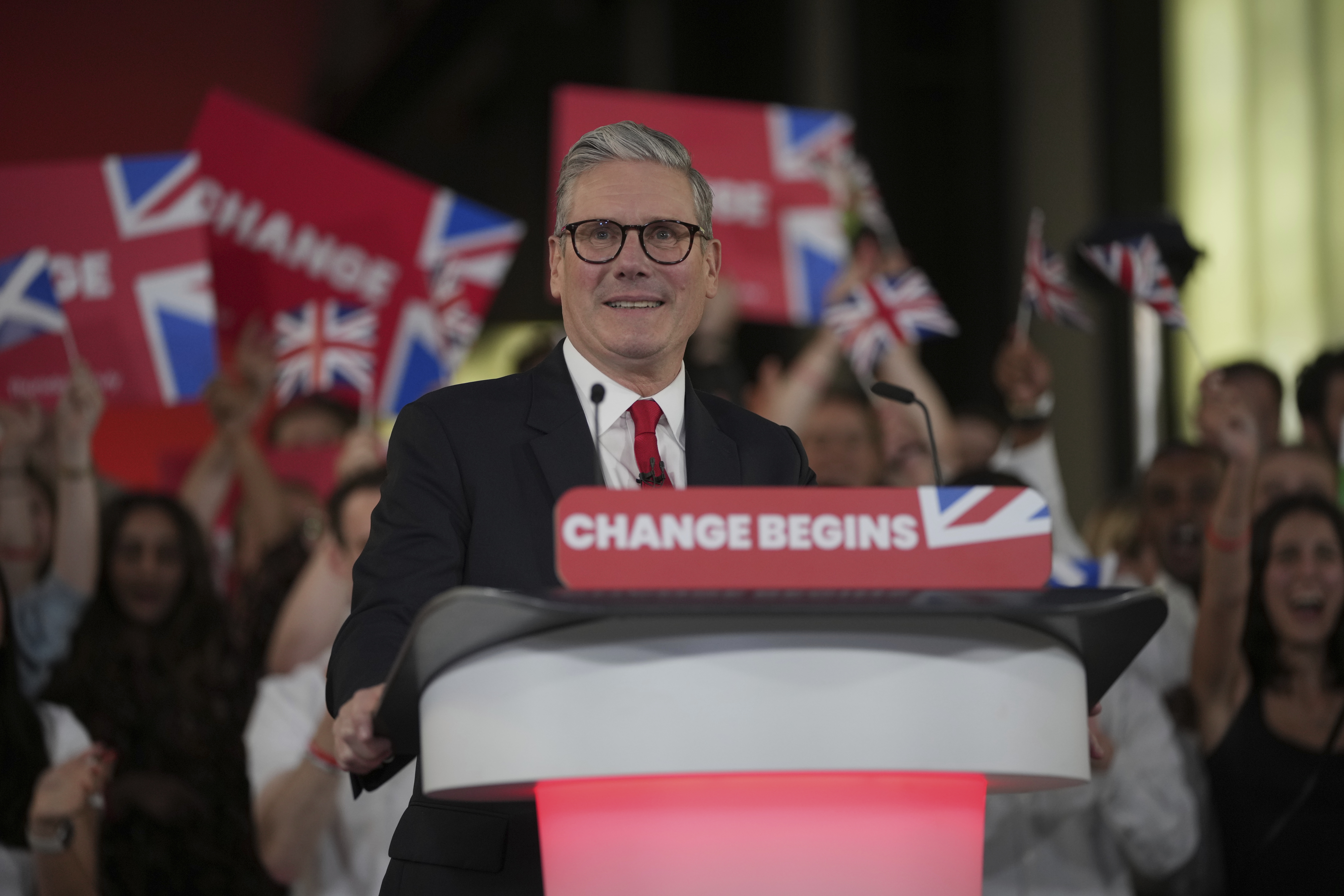UK Elections 2024
Historic success for the Liberal Democrats

Labour Party leader Keir Starmer speaks to his supporters at the Tate Modern in London, Friday, July 5, 2024.
© picture alliance / ASSOCIATED PRESS | Kin CheungIn the United Kingdom the choice of election date is left to the Prime Minister. Rishi Sunak could have remained in office until December but chose to go to the polls five months earlier in the hope of upsetting the Labour Party. He failed, spectacularly; and after nine years of Conservative majority government the UK has a Labour government again. While his victory is not as big as Tony Blair's in 1997, Sir Keir Starmer will govern with a considerable majority of seats in the House of Commons. Also noteworthy is the historically good performance of the LibDems, who have a chance to set the tone in the British political debate like never before.
Thus ends a chaotic nine years since the 2010-2015 Cameron-Clegg coalition. They began with the Brexit referendum and prime minister David Cameron's subsequent resignation in 2016 and saw Britain governed since then by four different Conservative prime ministers: Theresa May, Boris Johnson, Liz Truss and Rishi Sunak.
Labour wins despite low vote share
The result throws into sharp relief the peculiarity of the UK's non-proportional voting system. The new government has been elected with just 33.8% of the popular vote, the lowest ever winning share. Though the Labour Party gained only 1.6% more of the vote than it polled in 2019 (and considerably less than the 40% it polled in 2017 under Jeremy Corbyn) it overturned a comfortable Conservative majority to produce a large Labour majority. The Liberal Democrats increased their seats from just 11 to over 70 seats (11,6% in 2019 to 12,2 in 2024). The Scottish National Party polled over thirty per cent of the votes cast in Scotland but were rewarded with only 15% of Scotland's 57 seats in the UK Parliament.
The Conservative Party's vote plummeted by 20% and they returned fewer MPs than at any general election in the past 100 years. They were hit particularly badly by the last-minute entry into the campaign of Nigel Farage, whose Reform Party won over 14% of the vote and elected its first MPs to Westminster (four in total). Nonetheless the vote share of the Conservative Party and the Reform Party combined amounts to 38% of the popular vote, five per cent more than the Labour Party.
Liberal Democrats achieve historic gains
Liberal Democrat gains were concentrated south of the M4 motorway, particularly in the party's traditional south-west heartland. While dreams of replacing the Tories as the official opposition, as suggested in one or two rogue opinion polls, were unrealised, they nonetheless took the scalps of a number of government ministers and have emerged with more MPs than in over a century. Of all the party leaders, LibDem Leader Sir Ed Davey is credited with having fought the most effective election campaign. In Northern Ireland the liberal Alliance Party's deputy leader Stephen Farry MP was defeated, though the party won another seat.
Labour's gains came nationwide but were notably strong in Scotland, where the party trounced the Scottish nationalists, cutting the SNP's numbers from almost 50 to under 10. This reflects a public mood determined to oust the Tories and dissatisfaction with poor SNP performance in government in Edinburgh rather than a decline in support for Scottish independence.
Scandals and failures
The campaign went badly for the Conservatives from the outset. It's tone was set by the Prime Minister's impromptu press conference outside the doors of No.10 Downing Street which turned to farce as the skies opened above a politician with no raincoat or umbrella: farce became scandal when his close aides were discovered to have placed bets on the date of the general election using insider knowledge; and Sunak's failure to discipline them simply reinforced a public sense of a government having been in office too long.
The policies on offer from Conservatives and Labour were fundamentally similar; a country which has suffered badly from Brexit and an economic recession has little choice but to raise taxes and to limit government spending. Hopes that a Labour government might be more open to a rapprochement with the EU were dashed, however, by leader Sir Keir Starmer's statement, when victory was clearly in sight, that the UK would not re-join the EU's single market within his lifetime. This remains a fault-line in the country's political topography and is an issue which can be expected once more to divide the ruling party.
Finally, it is worth noting that among the LibDem MPs elected were five members of the Brighton Circle: Brian Matthew, Vikki Slade, David Chadwick, Caroline Voaden and Ed Morello. The Brighton Circle is a dialogue initiative between the Friedrich Naumann Foundation Europe and the Liberal Democrats, first initiated in 2019. It brings together aspiring UK Liberal leaders with representatives of liberal parties in continental Europe to discuss liberal solutions to common challenges. The Brighton Circle is highly invested in maintaining and strengthening post-Brexit ties with liberal partners and political networks in the EU, with its young members striving to reapproach the UK and EU long-term.
